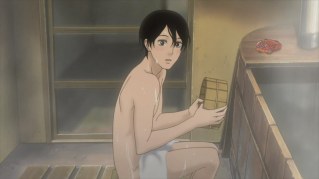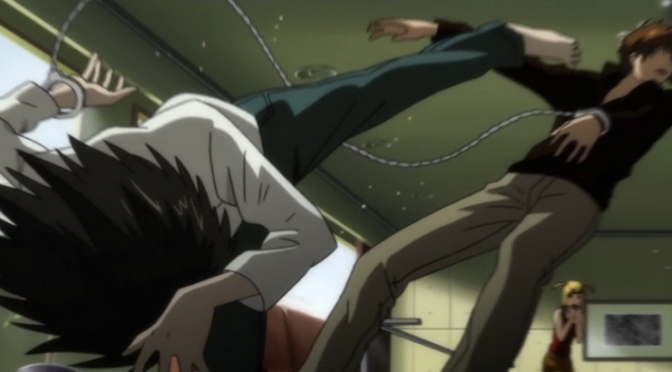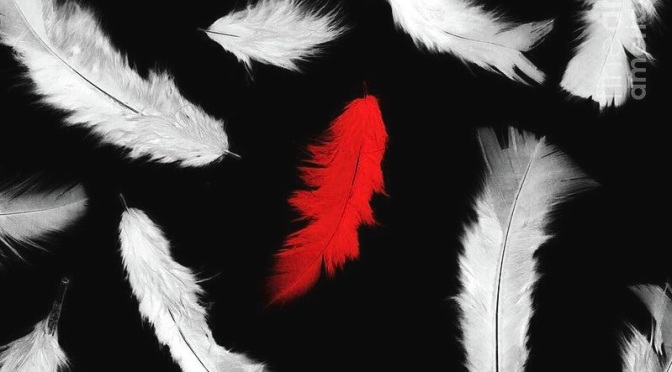This week for #SaitoSaturday I decided to give a little bit more of a clue than usual, because while Kagami gets a lot of love (he’s the namesake of the book, poor dear, and thus doomed), Akira gets…much less. Therefore, it’s back to chapter three, draft two, for a bit of a snippet that expands on an excerpt from a few weeks ago. Akira enters the fray via Taira Arashi, he-who-is-a-dragon-bastard, and one Watanabe Sakiko, she-who-is-a-pain-in-the-ass. Of course, he doesn’t know this yet, but he will…
The low, black throbbing of Taira Arashi’s laughter followed Akira out of his office and into the elevator, with the woman, Watanabe-san, right behind him. As they stepped out onto gold-veined marble of the first floor foyer, she smiled at him, almost a grin. “You did well, Saito-san. I’ve seen very few men hold their ground against Taira-sama.” 
“And this amuses you.” It did not amuse him.
“Oh, yes.” If she was aware of Akira’s irritation, Watanabe-san didn’t show it. “What is that old saying, laughter or tears? Perhaps you should keep it in mind, Saito-san.”
Shaking his head, Akira tugged at the hem of his jacket and scanned the foyer. The two of them seemed to be the only humans, at least judging by the breadth of the smiles aimed in his direction, their fanged promises. No one approached them, and yet he felt the weight of many eyes, much attention, and shuddered. “How do you work with him, Watanabe-san?”
She did not meet his eyes, scanned the room for a moment then slanted her gaze into the shadow of her own hair. “How? I wonder. Perhaps, as he said, it is just because this is a different time. Another era.”
Akira snorted, then cleared his throat . “Apologies, Watanabe-san. I… Having heard the stories of my parents and grandparents, I can’t see how anything is changed. ”
 Widening her eyes at him, she leaned closer. “No? Your job exists, doesn’t it? A hundred years ago there were no human police.”
Widening her eyes at him, she leaned closer. “No? Your job exists, doesn’t it? A hundred years ago there were no human police.”
“And what good does it do?” He kept his voice quiet, but Akira couldn’t let her statement go without challenge. “Eight out of ten cases reported are dropped, because in eight out of ten cases, the perpetrators are yokai. And that line? That’s where we lose all jurisdiction.”
There was something blase in her shrug, and she sashayed away from him, catching up with her gaze over her shoulder, pulling him along behind her with it. He followed because he had to, but she seemed to think it was her due. “Don’t such things make you eager to follow Taira-sama’s instructions? To make a place for yourself here in Asakusa, to expand your sphere of influence?” Watanabe-san settled herself on a soft couch and gestured at the chair across from her. “The lines one cannot cross, one must patrol…or at least observe carefully, even from a distance. Is that not so?”
 This woman. There was something strange in her smile, in her sudden sadness. Akira settled himself gingerly, trusting not even in the furniture in this place, and nodded slowly as he contemplated the woman and her words. Even her name was suggestive. “Perhaps we will be so lucky. Watanabe-san, I hope you don’t mind the question, but are you of any relation to Watanabe Jiro, head of the Relations commission?”
This woman. There was something strange in her smile, in her sudden sadness. Akira settled himself gingerly, trusting not even in the furniture in this place, and nodded slowly as he contemplated the woman and her words. Even her name was suggestive. “Perhaps we will be so lucky. Watanabe-san, I hope you don’t mind the question, but are you of any relation to Watanabe Jiro, head of the Relations commission?”
“The judge of YAMA?” Her laughter was very soft. “You could say that. He’s my husband.”
“Your – husband.” Akira blinked at her in confusion, then leaned forward, his elbows on his knees. “You’re married to the head of YAMA, and you work with Taira-sama?”
She hummed her affirmation, tapping her fingers on the arm of the couch, tilting her head as she smiled at him. “This surprises you? But my husband also works with yokai.”
Shrugging, Akira narrowed his gaze at her. As if the two were the same thing. “Of course, but -”
“And it is you and your work we should be discussing, Saito-san.”
The sharpness of her words stopped Akira short. Again, something…off stuck out to him, as if the edges of his woman’s presence were prickly, too hot, thorn-studded…something. “Ah…” Was there a flame in the flicker of her eyes, a glow burning brighter? No, couldn’t be. Just the florescence of the overhead lights. “Right. I apologize.”
*Interested in where this all begins? Check out the first KAGAMI post, which starts at the beginning of the book!











 Akira stripped off his shirt, was suddenly half-naked, and the shifting muscles under the skin of his bare back incited a need Kagami had never experienced before. Was this desire? This feeling, tight in his belly, hot in his chest, a startled ember rolling down his spine. His heartbeat – that he had a heartbeat – Kagami grew aware of its pulsing in his fingertips, the trapped, rigid length of his sudden erection, his lips, his tongue… Warmth fled his fingertips for his cheeks and the tops of his ears.
Akira stripped off his shirt, was suddenly half-naked, and the shifting muscles under the skin of his bare back incited a need Kagami had never experienced before. Was this desire? This feeling, tight in his belly, hot in his chest, a startled ember rolling down his spine. His heartbeat – that he had a heartbeat – Kagami grew aware of its pulsing in his fingertips, the trapped, rigid length of his sudden erection, his lips, his tongue… Warmth fled his fingertips for his cheeks and the tops of his ears. A rough rush of something like summer lightning spurred Kagami forward a step, had him reaching out, but he jerked his hand back as Akira doused himself with spray. It came from a shower head outside the ofuro, and Kagami regarded it with interest…but not as much as Akira. Wasn’t the bath already full of water? Why would he need to get wide outside of it? But when he was wet all over, the man sat on the stool, took a washcloth and soap and started to scrub himself around blossoming purple bruises. “If you’re gonna stand there and stare, you wanna wash my back?”
A rough rush of something like summer lightning spurred Kagami forward a step, had him reaching out, but he jerked his hand back as Akira doused himself with spray. It came from a shower head outside the ofuro, and Kagami regarded it with interest…but not as much as Akira. Wasn’t the bath already full of water? Why would he need to get wide outside of it? But when he was wet all over, the man sat on the stool, took a washcloth and soap and started to scrub himself around blossoming purple bruises. “If you’re gonna stand there and stare, you wanna wash my back?” Kagami gloried in being looked at, being seen, as much as in the fact that Akira seemed to return his desire. “I can…I can do that.” It was only as he took the cloth from Akira’s hands and started to rub it against his shoulder that Kagami realized this gave him permission to touch without misgivings or embarrassment. He stopped moving the washcloth to follow the lines of the policeman’s back with the tips of his fingers instead, tracing lines beneath the suds. Thin, pale ridges of scar tissue came under his hands, and he frowned, staring. An old wound?
Kagami gloried in being looked at, being seen, as much as in the fact that Akira seemed to return his desire. “I can…I can do that.” It was only as he took the cloth from Akira’s hands and started to rub it against his shoulder that Kagami realized this gave him permission to touch without misgivings or embarrassment. He stopped moving the washcloth to follow the lines of the policeman’s back with the tips of his fingers instead, tracing lines beneath the suds. Thin, pale ridges of scar tissue came under his hands, and he frowned, staring. An old wound?












